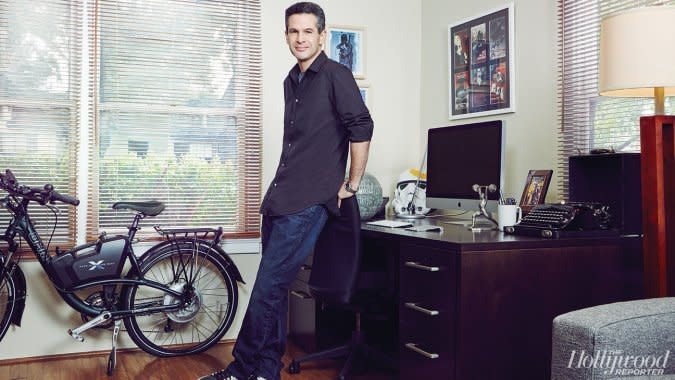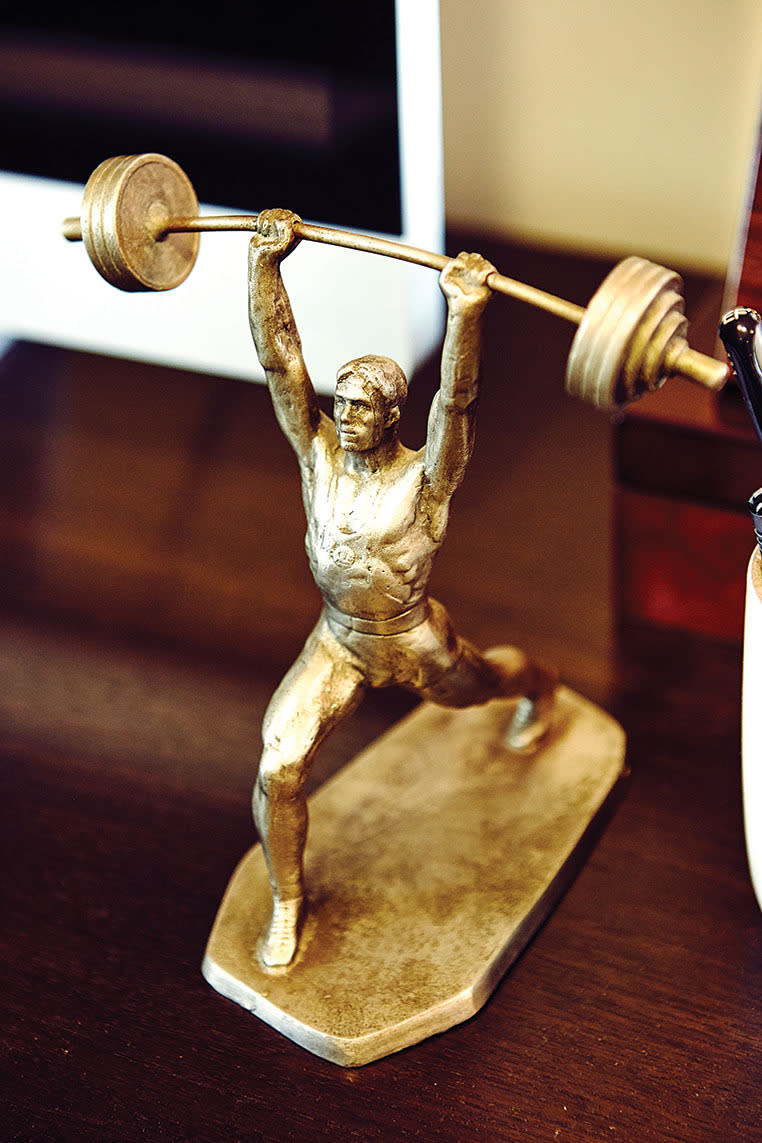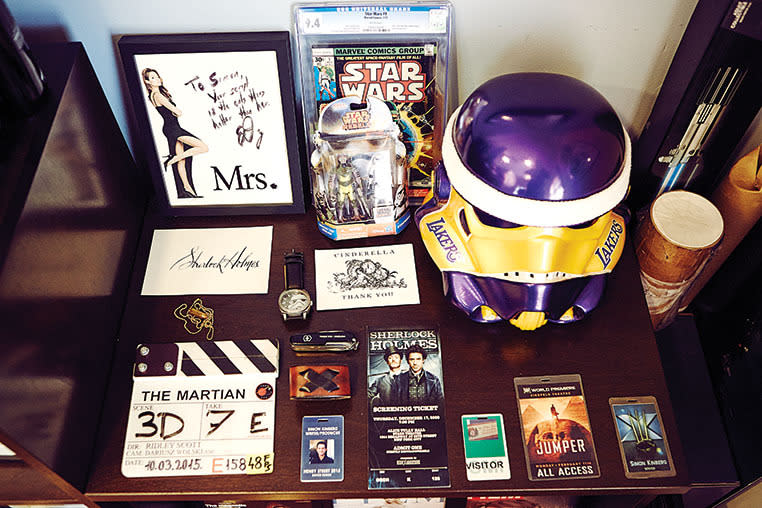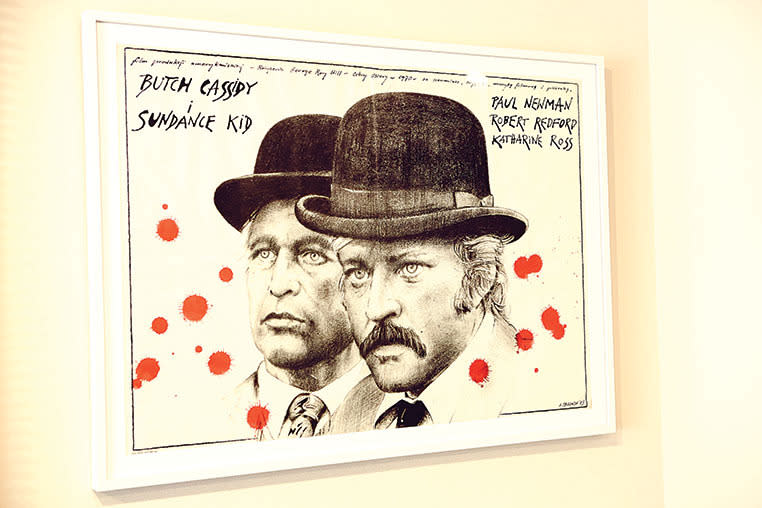'Martian' Producer Simon Kinberg on 'Fantastic Four' Woes, Jennifer Lawrence's Uncertain 'X-Men' Future and 'Star Wars' Secrets

“At some point, I will grow up and want to tell a more quiet, little story,” says Kinberg, photographed Sept. 15 in his office on the Fox lot. (Photo: Hussein Katz)
The founder of Genre Films also discusses how Ridley Scott wasn’t the first choice the direct ‘Martian’ and whether he’d work with director Josh Trank again.
This story first appeared in the Oct. 16 issue of The Hollywood Reporter magazine. To receive the magazine, click here to subscribe.
By Tatiana Siegel
Simon Kinberg isn’t opposed to making small movies. The tentpole maestro behind Cinderella (produced), Sherlock Holmes (wrote) and X-Men: Days of Future Past (produced and wrote) says he’s attempted an intimate drama, but inevitably it turned epic. “When I wrote Mr. & Mrs. Smith in film school [at Columbia University], I was trying to write my version of Ordinary People or Kramer vs. Kramer — people in a bad marriage who have to get through problems. But for me, that’s two spies trying to assassinate each other,” he jokes. When Lucasfilm’s Kathleen Kennedy was pulling together her team for Star Wars, she turned to Kinberg to be a creative consultant on Episode VII: The Force Awakens (Dec. 18), to produce and write a spinoff movie, and to create the TV series Star Wars Rebels. The projects offer Kinberg a chance to revisit his youth. The 42-year-old father of two sons spent his early childhood in London (he moved to Los Angeles at age 6), where the Star Wars films shoot in top secrecy. And when Toys R Us launched its “Force Friday” event in September, it was Kinberg who braved the midnight pandemonium. “I was first in line for f—ing toys in Burbank,” he says. Kinberg, whose five-employee company is based on the Fox lot with a deal that is said to be among the richest in Hollywood, rebounded from this summer’s superhero flop Fantastic Four with The Martian, which opened to a huge $99 million worldwide. Kinberg sat down with THR at the Toronto Film Festival (where The Martian premiered) and revealed why Ridley Scott wasn’t the original choice to direct, the dire consequences of spilling Star Wars secrets and whether he’d work with Fantastic Four’s disgruntled director Josh Trank again.
Read More: 'The Martian’: TIFF Review
The Martian probably will get a China release given that Chinese scientists play a key role. Was that intentional?
No. It was in the book, and the book wasn’t written to be a movie. I don’t think that [author] Andy [Weir] thought he was going to sell the movie rights. Andy self-published it in chapters as an e-book, and then we found it and bought the rights.
Why didn’t you write the movie yourself?
I was in the middle of writing Days of Future Past at the time. But even if I was available, I think I would have given it to Drew [Goddard]. This fits so perfectly with his voice and background. His parents are scientists. He loves the real scientific world. And there is a sort of intelligent optimism to Drew as a human being and an artist. I may be slightly darker than Drew, and I may not have written as unabashedly optimistic a script. Part of what I love about producing is to get to work with writers. When you’re a writer in Hollywood, you don’t get to work with other writers. You barely get to meet other writers. We’re interchangeable, disposable pieces that never really get to collaborate.
And why didn’t Drew end up directing it?
He was doing Sinister Six, and [Sony] made a decision to move that up to being the next Spider-Man movie. It felt like a once-in-a-lifetime opportunity for him. And then Michael Schaefer, who runs Ridley’s company, read the script and loved it.

Former New Regency exec Sanford Panitch gave this statue to Kinberg after making 'Mr. & Mrs. Smith’: “We shot a lot of reshoots that were very difficult days.”
What percentage of time do you spend producing versus writing?
I produce more movies than I write, but when I write, it is such an immersive, intense process that it probably takes as much or more time than producing multiple movies. When I’m writing a first draft of a script, I can disappear into that for two, three months exclusively. And when I am on set of something that I’m the writer-producer of, like Days of Future Past or the new X-Men movie, Apocalypse [May 27], it’s a slightly more intense experience. But in actual man hours, I would say 60 percent producing, 40 percent writing.
What do you say to the criticism that you’re spread too thin and it impacted Fantastic Four?
I was there every day on set of Fan Four, as I am on anything that I’m the writer and the producer of. Some movies work out and some don’t. In my experience, there’s not a direct correlation between the process and the product, meaning, I’ve been on some really hard movies, like Mr. & Mrs. Smith, where we shot a lot of reshoots that were very difficult days, as extensively reported — and in some places, accurately reported. So, I read stories about troubled movies and then I go see the movies and I’m like, “Wow, that movie turned out to be a great movie.” There’s a lot of crazy-talented writers, directors, actors who are difficult, and their films turn out great. And then there’s some people who are lovely, wonderful human beings and the process is a joy, and the movie is flat. I don’t subscribe to the idea that a happy process makes a happy product or an unhappy process makes a broken product. Also, the actual number of movies I’m working on is probably less than the average producer who has a deal at a studio.
Read More: Simon Kinberg on 'Fantastic Four’ Failure: “Movies Are Hard to Make”
What really went wrong with Fantastic Four?
I haven’t really done a full diagnosis. It was a hard movie to make, but I’ve made a lot of hard movies. I do think that there is a great Fantastic Four movie with that cast. But there’s so many different elements that need to come together perfectly. It’s like a collaboration between all these strangers. And if there’s a few things that don’t go right, it’s hard to recover from. I went straight from that into [X-Men:] Apocalypse. I haven’t had a lot of time to decompress. I’m obviously disappointed with the way it turned out.
Trank tweeted that his version of the movie was better than the one released. Did it hurt box office?
Honestly, I have no idea. I’ve had other movies not work before. For whatever reason, that movie not working became very public — and that was hard because you put a lot of time and effort and love into everything you do, and I really love a lot of people on that film and felt really close to the actors. Those are the guys whose faces are on the poster and are the most exposed. I hope we get to make more movies with them. But it was disappointing.
Would you work with Trank again?
In the right context? Sure.

“I collect tons of tchotchkes from movies. These ID badges go back more than a decade. The Lakers Stormtrooper helmet was a gift from the folks at Lucasfilm.”
Read More: 'X-Men: Apocalypse’ Is “The Culmination” of Previous Movies, Says Simon Kinberg
Has there been talk about bringing in Marvel to revive Fantastic Four like Sony did for Spider-Man?
Not to my knowledge.
What is the long-term plan for the X-Men movies?
We want to keep making them. Obviously, part of what we’re doing now is stand-alone movies with new characters. So we have the Deadpool movie [Feb. 12], we’re doing a Gambit movie [seeking a director]. We’re doing another Wolverine. And then we have the mainline X-Men movies with Professor X, Magneto, Mystique, Beast that we started with First Class, Days of Future Past, Apocalypse. I would love to keep making movies with that cast. It’s almost like the way the Star Wars movies now are. The Episodes are the mainline movies, and then you have the stand-alone movies. The X-Men flagship is [Michael] Fassbender, [James] McAvoy, Jen [Lawrence] and Nick Hoult, and then we have the stand-alone movies.
Apocalypse is the third X-Men movie for Lawrence. Have she and the others signed on for more?
I believe we’d have to do new deals with those actors. We had three-picture deals with them.

“Butch Cassidy and the Sundance Kid is one of my all-time favorite films. I got this poster at a little shop in Soho.”
Read More: 'Star Wars’ Force Friday: A Multi-Store, Midnight Toy Raid (and a Simon Kinberg Cameo)
Will Star Wars spinoffs connect to the main movies?
I’m careful not to talk about the content of any Star Wars movie, so I will say no comment.
What happens to you if you spill a Star Wars secret?
I don’t worry about my physical safety (laughs). It’s like Fight Club. The first rule of Star Wars is you don’t talk about it.
Is Disney CEO Robert Iger involved in the movies?
I don’t know on the Episodes, but he is on the spinoffs. And he was involved when we were making Cinderella. That guy is like the president of 10 countries at the same time. I have no idea how he has time to do everything that he does. I think part of it for him is that he genuinely loves what he’s doing and he’s still excited and inspired by the different aspects of his job.

“I give my kids most of the 'Star Wars Rebels’ stuff, but a few things I steal for myself,” Kinberg said.
Read More: 'Star Wars: Force Awakens’ Script Made John Boyega Cry
Force Awakens and the first spinoff are said to have strong women characters. Is this a move to cultivate more young female fans for Star Wars?
I don’t know if it’s calculated. Part of what we all want to do is make movies that look like the world we live in. Over half the world we live in is female, and we don’t live in an all-white world. The moviegoing world looks like our world. That hasn’t always been true in big-budget movies. Certainly, there are female protagonists, but very few in big-budget movies. In the past, they’ve tended to be pretty whitewashed.
Disney’s live-action division has a reputation for being tightfisted with talent. Were the Cinderella deals worse than any other studio deals?
No. People were paid well on Cinderella. We hired some of the best people in the world, and their departments are not stingy departments.
Read More: ’The Martian’s’ Matt Damon Talks 'Bourne’ Return, Politics and PC Flubs: “Oh My God, I Look Like an Asshole”
You made Chappie and Elysium with Sony. Do you feel Amy Pascal was treated unfairly?
She was unfairly treated by the press. I feel terrible for her because I think she is a deeply good person. There are plenty of people in Hollywood who are not good people, and if you would open up their emails, you’d see truly reprehensible things. Amy is one of the good guys.

